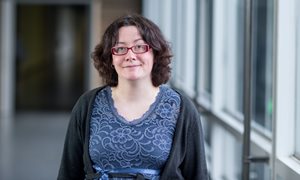5 April 2019
“We are very pleased that such a prominent principal investigator, with remarkable experience in the fields of research, education and patient care, will hold the position of scientific director a.i. of the Radboud Institute for Health Sciences”, states Paul Smits, chair of the Executive Board and dean of Radboud university medical center.
 Judith Prins, full professor of Medical Psychology and prominent principal investigator, has been appointed scientific director ad interim (a.i.) of the Radboud Institute for Health Sciences (RIHS) as of 1 April. She succeeds Bart Kiemeney, who will focus on carrying out research and teaching again after his RIHS directorship of more than seven years.
Judith Prins, full professor of Medical Psychology and prominent principal investigator, has been appointed scientific director ad interim (a.i.) of the Radboud Institute for Health Sciences (RIHS) as of 1 April. She succeeds Bart Kiemeney, who will focus on carrying out research and teaching again after his RIHS directorship of more than seven years.
“We are very pleased that such a prominent principal investigator, with remarkable experience in the fields of research, education and patient care, will hold the position of scientific director a.i. of the Radboud Institute for Health Sciences”, states Paul Smits, chair of the Executive Board and dean of Radboud university medical center.
-
Want to know more about these subjects? Click on the buttons below for more news.
Related news items

Giesje Nefs receives fellowship from the Diabetes Fund
10 January 2022 Diabetes technology - such as insulin pumps, closed loop systems, sensors, smart insulin pens - is evolving enormously. But there are also concerns, or false expectations. Giesje Nefs wants to gain more insight into this so she can help people make their choice. read more
Cognitive behavioral therapy reduces severe fatigue in patients with advanced cancer during treatment
28 January 2020 In Annals of Oncology, RIHS researchers Hanneke Poort, Marlies Peters, Winette van der Graaf, Ria Nijhuis-van der Sanden and colleagues showed significant effects of cognitive behavioral therapy on fatigue in patients with advanced cancer during treatment with palliative intent. read more
Timely extra care due to early screening for fear after cancer diagnosis
26 March 2018 Medical Psychologist Simone Sint Nicolaas found out how to screen early for risk factors associated with these problems. As a result, families who need this can be provided with timely extra care. read more


